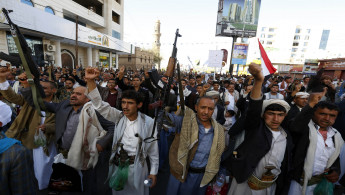Oman offers seven-point peace plan for Yemen
Political initiatives and negotiations are under way to reach a solution in Yemen, despite the continuing Saudi air raids and clashes on the ground..
Principal among these are the efforts lead by Oman, which lies to the east of Yemen and is the only Gulf Cooperation Council (GCC) member not to participate in the Saudi-led campaign which started on March 26.
The deputy Russian foreign minister, Gennady Gatilov, told the Russian news agency Tass on Thursday that a Saudi-led ground offensive would make a political solution harder to achieve.
"We call for an end to military operations and the launch of a political dialogue between the rival parties," Gatilov said.
Seven-point plan
Speaking to al-Araby al-Jadeed on condition of anonymity, sources said that Oman was playing a big part in ongoing negotiations to bring about a ceasefire.
There have also been reports of an Omani initiative in coordination with Saudi Arabia and Iran. The initiative, announced by Saudi media outlets, includes seven points:
1. The withdrawal of the Houthis and forces loyal to deposed president Ali Abdullah Saleh from all Yemeni cities and the return of military hardware and munitions seized from the army.
2. The restoration of the president Abd Rabbo Mansour Hadi and the government of Khalid Bahah.
3. Early parliamentary and presidential elections.
4. An agreement signed by all Yemeni parties.
5. The conversion of the Houthis into a political party.
6. An international aid conference attended by donor states.
7. Yemen entering the Gulf Cooperation Council.
The initiative did not say whether the coalition's operations in Yemen should stop, leading some to suggest that there are additional points to the agreement that have not been disclosed.
Saleh's party, the General People's Congresss has said that it would deal with the resolution "positively".
Marzieh Afkham, speaking for the Iranian foreign ministry, said that Iran was willing to contemplate the initiative.
"If this initiative receives the support of official sources, it would be possible to have a discussion and exchange viewpoints about it," Afkham said.
Muscat has received numerous political and diplomatic meetings in recent weeks, including a visit by the Iranian foreign minister, Mohammad Javad Zarif, which centred on the situation in Yemen.
Abubakr al-Qirbi, the former Yemeni foreign minister and a leading member of the GPC, also visited Oman.
The Houthi position
The Houthi movement has continued to refuse to make concessions, especially with regards to withdrawing from major cities.
Muhammed Abdul Salam, the Houthi spokesman, had said that an end to military operations was a condition of a return to talks.
Abdul Salam also called for the resumption of talks overseen by the UN, and underlined the importance of Yemen's Peace and Partnership Agreement signed in September after the Houthi takeover of Sanaa.
Abdul Salam defended the actions of Houthi-Saleh forces in Yemen's southern provinces by saying they were fighting al-Qaeda, and those battles would not be subject to any agreements.





 Follow the Middle East's top stories in English at The New Arab on Google News
Follow the Middle East's top stories in English at The New Arab on Google News


